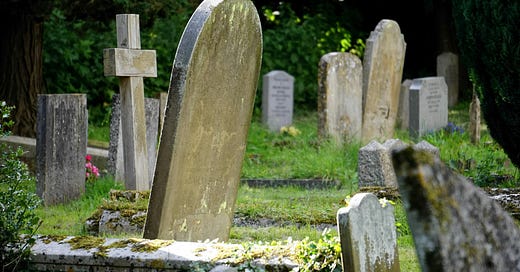John Donne was born and raised a Catholic, but chose to convert to Church of England rather than face the consistent vitriol and prejudice that awaited him in the academic societies of England during his time. His love poems are full of theological language, his theological poems full of love imagery. This poem, taken from his collection titled “Holy Sonnets” features a speaker confident enough to give death a rather condescending lecture.
Sonnet 10 Death, be not proud, though some have called thee Mighty and dreadful, for thou art not so; For those whom thou think'st thou dost overthrow Die not, poor Death, nor yet canst thou kill me. From rest and sleep, which but thy pictures be, Much pleasure; then from thee much more must flow, And soonest our best men with thee do go, Rest of their bones, and soul's delivery. Thou art slave to fate, chance, kings, and desperate men, And dost with poison, war, and sickness dwell, And poppy or charms can make us sleep as well And better than thy stroke; why swell'st thou then? One short sleep past, we wake eternally And death shall be no more; Death, thou shalt die.
I love this poem because, in my opinion, the purpose of this whole poem is to get people to stop personifying death. And how does he do it? By personifying death.
Right off the bat the speaker tells Death not to think so highly of himself, and he offers two reasons. First, dying isn’t the ending that it appears to be. “Those whom thou think'st thou dost overthrow die not, poor Death, nor yet canst thou kill me.” There is a religious assumption here (one I happen to agree with), that our souls “wake eternally” and that one day death, too, shall cease to be. But this poem isn’t purely oriented towards the distant future, waiting for the last enemy to be defeated. Yes, it hopes for that, but it calls for Death, with a capital D, to die today.
“Thou art slave to fate, chance, kings, and desperate men.” Death isn’t some grand being, with intention or design. No, death is a slave, and a slave to desperate men. Death is a slave to poppy, charms, sickness, war. We need to stop giving death a majesty and intention that it doesn’t deserve. It is merely something that happens to each and every one of us, and it rarely happens in an ordered or intelligent way. It has no existence apart from us, rather it is a part of our existence.
So, Donne puns a bit with the last two lines of his poem. He reminds us that when we wake eternally death, the reality, will be no more. But he is also asking us to let “Death” the powerful, false personification die today.





